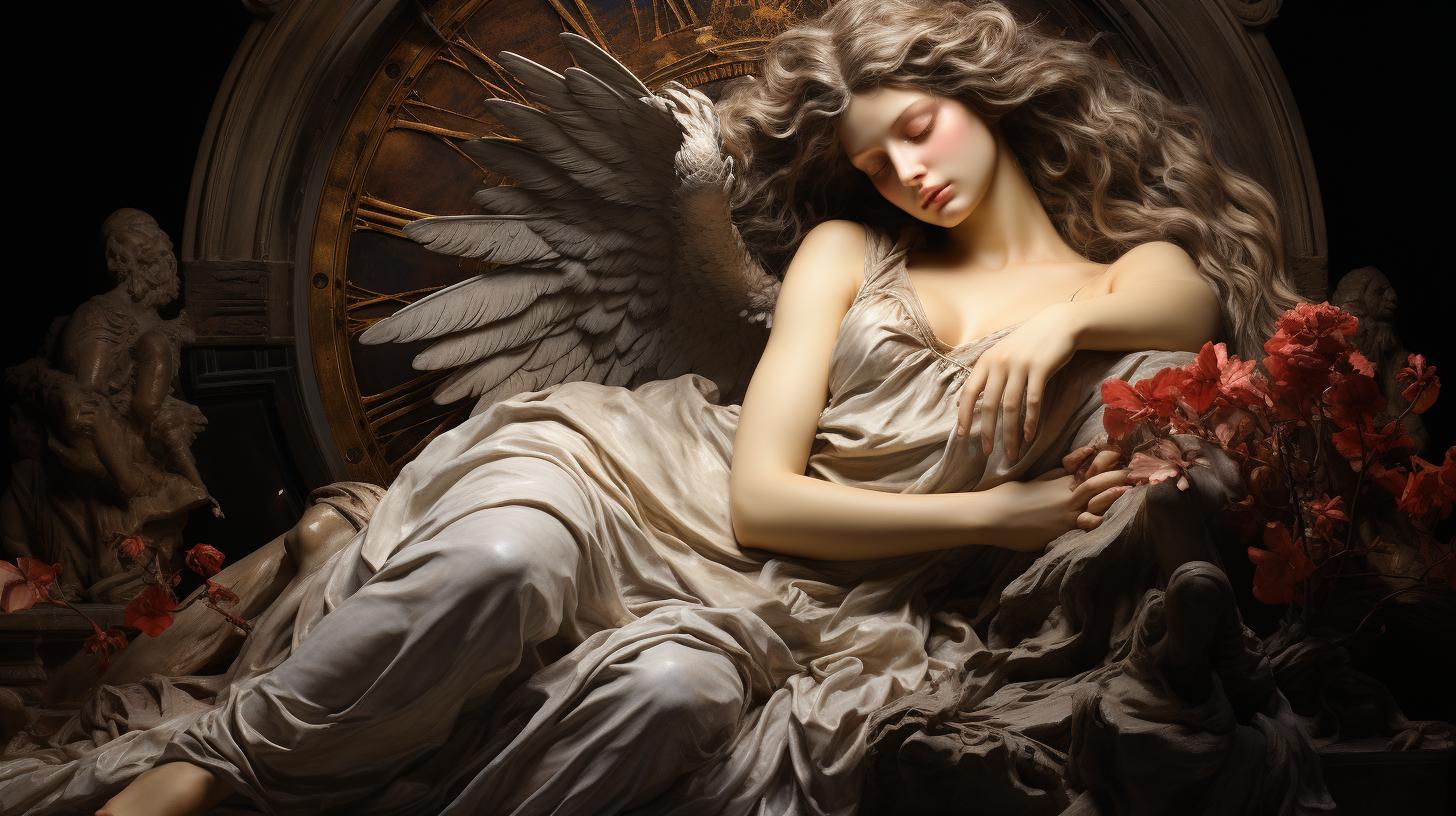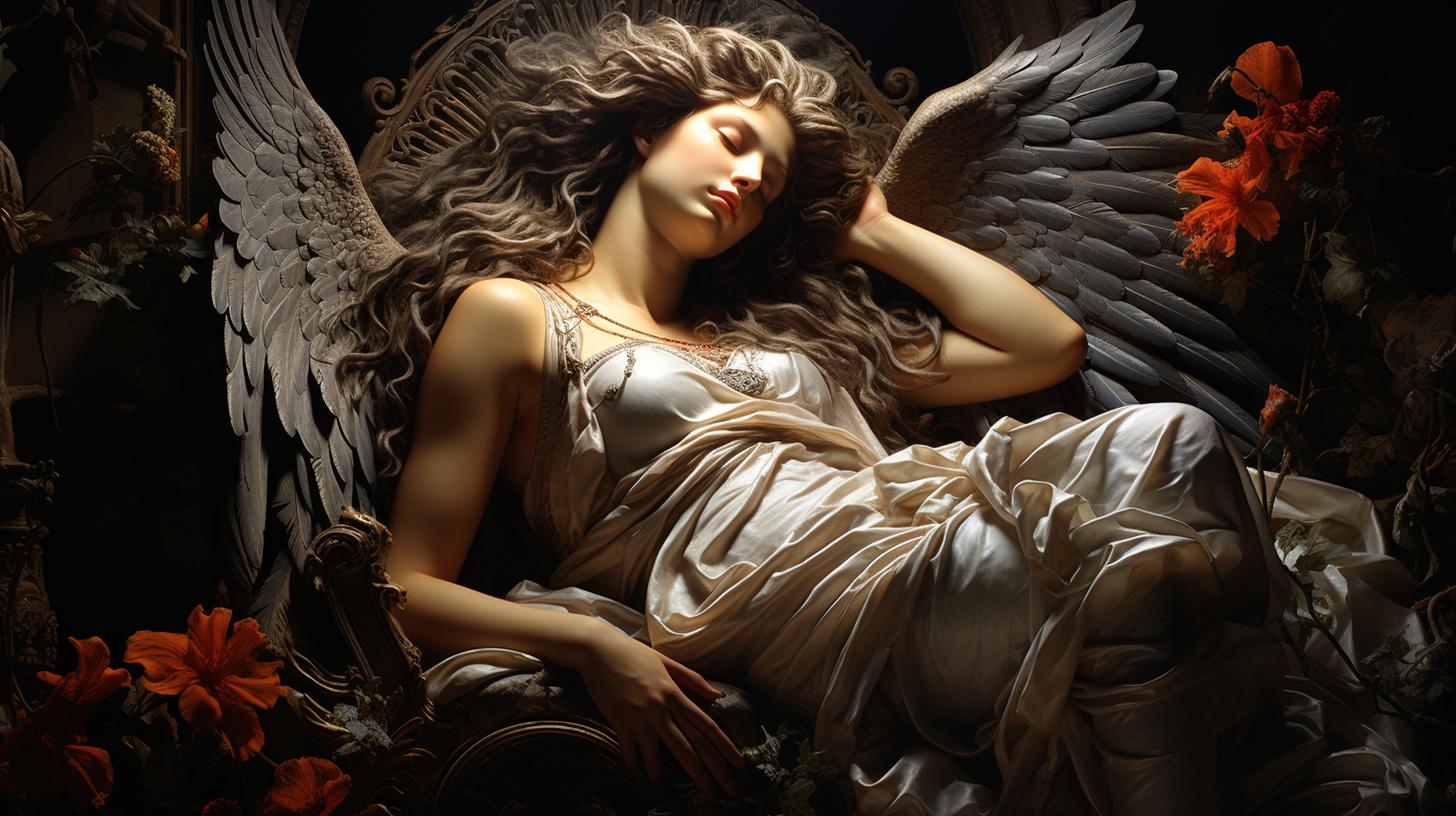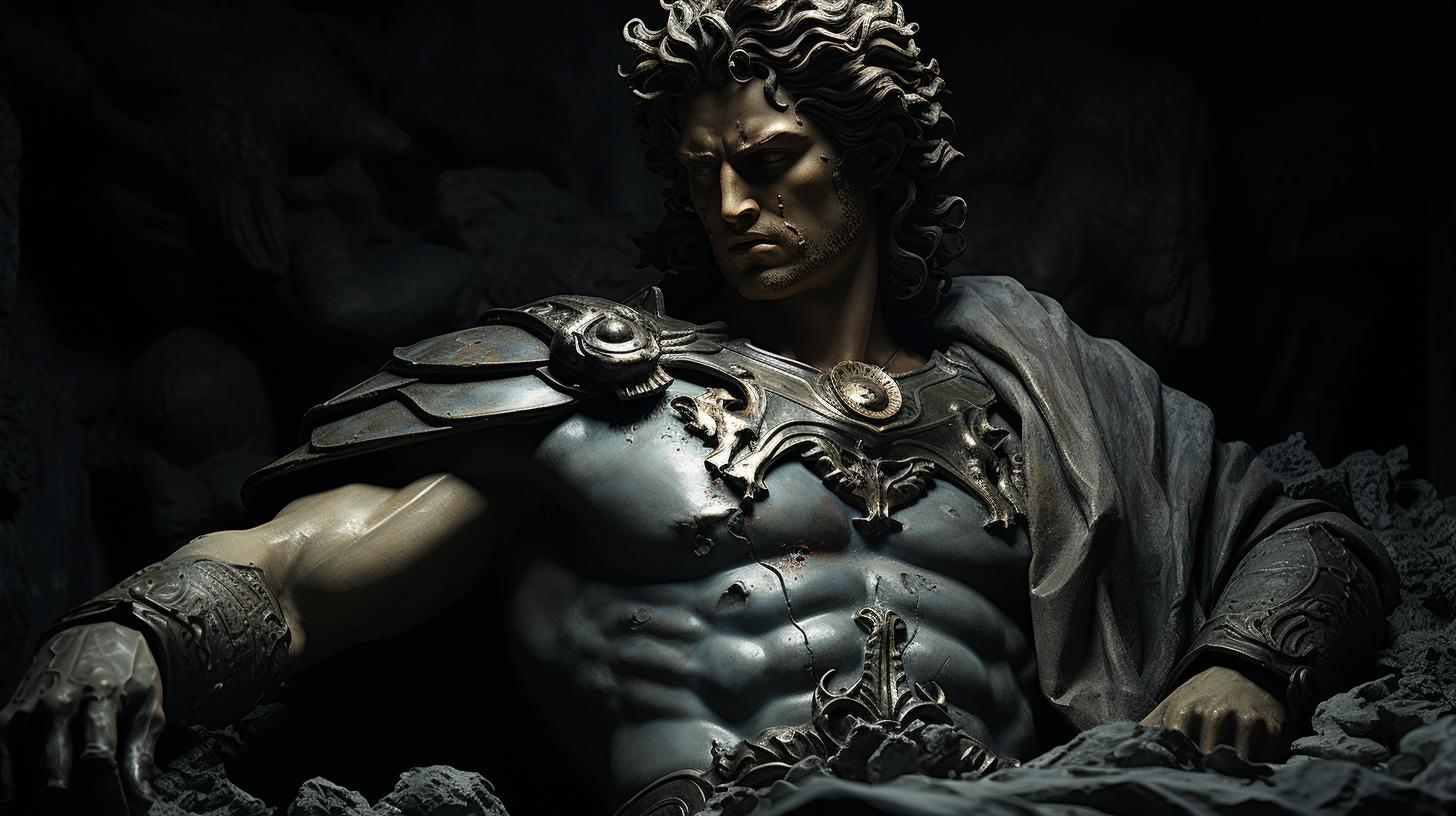Discover the Enchanting Realm of Pasithea in Greek Mythology

Pasithea, a minor goddess in Greek mythology, is associated with rest, relaxation, and meditation. She is part of the Charites or Graces, goddesses of beauty, creativity, and nature.
Pasithea’s name has different interpretations, some suggesting it means ‘acquired sight’ while others argue it means ‘acquired goddess.’ She is believed to be the daughter of Zeus and Eurynome or Hera and Dionysus. Her marriage to Hypnos, the god of sleep, resulted in the birth of the Oneiroi, deities of dreams.
Although not extensively mentioned, Pasithea’s role and associations contribute to her importance within Greek mythology.
The Background of Pasithea Greek Mythology
The origins and family background of Pasithea shed light on her significance in Greek mythology. As a minor goddess, she is associated with rest, relaxation, and meditation. Pasithea belongs to the group known as the Kharites or Graces, who are revered for their beauty, creativity, and connection to nature.
Origins and Family Background of Pasithea
Pasithea’s parentage is a subject of debate among scholars. While some believe that her parents are Zeus and Eurynome, others attribute her lineage to Hera and Dionysus. This discrepancy may stem from her associations with altered perceptions and consciousness, which align with Dionysus, the god of wine, and Hera, the queen of the gods.
Associations with the Kharites or Graces
As a member of the Kharites or Graces, Pasithea embodies qualities such as beauty, charm, creativity, fertility, goodwill, and nature. She complements her sisters with her unique connection to rest, relaxation, and meditation.
Pasithea’s inclusion in this divine sisterhood highlights the importance of these qualities in Greek mythology.
The Different Interpretations of Pasithea’s Name
Pasithea’s name offers intriguing possibilities for interpretation. Some suggest that it means ‘acquired sight,’ linking her to hallucinations and altered states of consciousness. Others argue that it means ‘acquired goddess,’ reflecting her marriage to Hypnos, the god of sleep.
The variations in these interpretations further enrich our understanding of Pasithea’s role in Greek mythology.
Pasithea: The Goddess of Rest and Relaxation
Pasithea, a minor goddess in Greek mythology, takes on a significant role as the embodiment of rest and relaxation. Within the realm of Greek mythology, Pasithea’s presence brings a sense of tranquility and calmness.
Let’s explore her role, associations, and symbolism.
The Role of Pasithea in Greek Mythology
As one of the younger members of the Charites or Graces, Pasithea fulfills her duties by fostering an atmosphere of rest and relaxation. She is held in high regard for soothing and calming individuals, providing them with respite from the stresses of life.
Pasithea’s Associations with Rest, Relaxation, and Meditation
Pasithea’s prominence lies in her connection to rest, relaxation, and meditation. She is often invoked by mortals seeking tranquility, inner peace, and a break from the challenges of the world. Her presence brings about a sense of serenity and allows for rejuvenation of the mind, body, and spirit.
The Symbolism of Pasithea in Greek Mythology
Symbolically, Pasithea represents the importance of rest and relaxation in the human experience. Her association with tranquility serves as a reminder of the significance of finding balance and taking time for self-care.
Pasithea’s presence reminds us of the healing power of rest and the value of embracing moments of stillness and introspection.
Overall, Pasithea’s role as the goddess of rest and relaxation shines a light on the importance of finding inner peace and rejuvenation.
Her associations and symbolism contribute to the understanding of the necessary balance between activity and rest within Greek mythology and in our own lives.
Pasithea: Marriage to Hypnos and the Oneiroi
Pasithea’s marriage to Hypnos, the god of sleep, holds significant mythological importance in Greek mythology.
Their union resulted in the birth of the Oneiroi, a group of deities responsible for different types of dreams.
The Mythological Relationship between Pasithea and Hypnos
Pasithea’s marriage to Hypnos represents the merging of restful qualities and altered consciousness. As the goddess of relaxation and meditation, Pasithea complements Hypnos’ domain over sleep and dreams. Their union symbolizes the harmonious blend of serenity and slumber, creating a serene dreamlike realm.
Pasithea’s Offspring: The Oneiroi and Their Roles
The Oneiroi, born from the union of Pasithea and Hypnos, each possess unique roles within the realm of dreams. Morpheus, the most well-known Oneiros, is responsible for shaping human dreams, presenting them in a vivid and lifelike form.
Phobetor specializes in creating nightmarish visions, instilling fear in the dreamer’s mind. Phantasos crafts dreams of the inanimate, bringing forth images of non-living objects, while Icelos manifests dreams resembling other individuals, making the dreamer encounter familiar faces.
The Influence of Pasithea’s Marriage on Greek Mythology
Pasithea’s marriage to Hypnos not only connects her to the world of dreams but also reflects the interconnectedness of various aspects of Greek mythology. The union of rest, relaxation, and altered consciousness with sleep and dreams showcases the intricate web of relationships within the pantheon and highlights the significance of dreams in ancient Greek culture.
Pasithea: References and Interpretations in Literature
Pasithea’s Mention in Homer’s ‘Iliad’
In Homer’s epic poem, the ‘Iliad,’ Pasithea makes a brief yet significant appearance. In the 14th book of the ‘Iliad,’ Hera approaches Hypnos, the god of sleep, to put Zeus to sleep.
To convince Hypnos, Hera promises him Pasithea’s hand in marriage. This interaction showcases Pasithea’s role as a bargaining tool and highlights her connection to the realm of sleep and dreams.
The mention of Pasithea in the ‘Iliad’ underscores her importance as a lesser-known deity within the Greek pantheon.
Pasithea’s Depiction in Other Greek and Roman Texts
Beyond Homer’s ‘Iliad,’ Pasithea is referenced and depicted in various Greek and Roman texts. While she may not be the central focus in these works, her associations with rest, relaxation, and altered consciousness are often mentioned in passing.
Pasithea’s name and role in Greek mythology contribute to the broader understanding of divine beings and their domains, particularly in relation to the realms of dreams and altered states of perception.
Analyzing Pasithea’s Role in Greek Mythological Works
Pasithea’s role in Greek mythological works goes beyond her limited mentions. Scholars have analyzed her associations and symbolism, unraveling the deeper meaning behind her representation. By examining her connections to rest, relaxation, meditation, and hallucinations, researchers gain insights into the ancient Greeks’ perceptions of these concepts.
Through these analyses, Pasithea emerges as a minor goddess with a significant role in shaping the mythology of dreams and altered consciousness.
- Pasithea’s appearance in Homer’s ‘Iliad’ showcases her role as a bargaining tool and highlights her connection to sleep and dreams.
- In other Greek and Roman texts, Pasithea is often mentioned in passing, emphasizing her associations with rest, relaxation, and altered consciousness.
- Analyzing Pasithea’s role allows for a deeper understanding of the ancient Greeks’ perceptions of rest, relaxation, meditation, and hallucinations.
Pasithea: Meaning and Significance in Greek Mythology
Exploring the depths of Pasithea’s meaning and unraveling her symbolic significance sheds light on her importance within Greek mythology.
Exploring the Various Interpretations of Pasithea’s Meaning
The name Pasithea carries multiple interpretations, each offering unique insights into her essence. Some scholars suggest it signifies “acquired sight,” implying her association with hallucinations and altered perceptions. Others argue it means “acquired goddess,” emphasizing her marriage to Hypnos, the god of sleep.
Diving into these interpretations deepens our understanding of Pasithea’s role and nature.
Pasithea’s Symbolic Significance in Greek Mythology
Pasithea embodies qualities closely tied to rest, relaxation, and meditation. As a goddess of beauty and charm, she adds an aesthetic aspect to her symbolism. Additionally, her role as one of the Charites or Graces highlights her connection to creativity, goodwill, and nature.
Unraveling the symbolism behind Pasithea unveils the interplay of these elements and their significance in Greek mythology.
Understanding the Importance of Pasithea in the Pantheon
While Pasithea may be considered a minor goddess, her marriage to Hypnos and her involvement in the story of the ‘Iliad’ underscore her significance. Through her union with Hypnos, she becomes the mother of the Oneiroi, the deities responsible for various types of dreams.
Delving into Pasithea’s place in the pantheon enhances our comprehension of the intricate web of relationships and dynamics within Greek mythology.
.




















